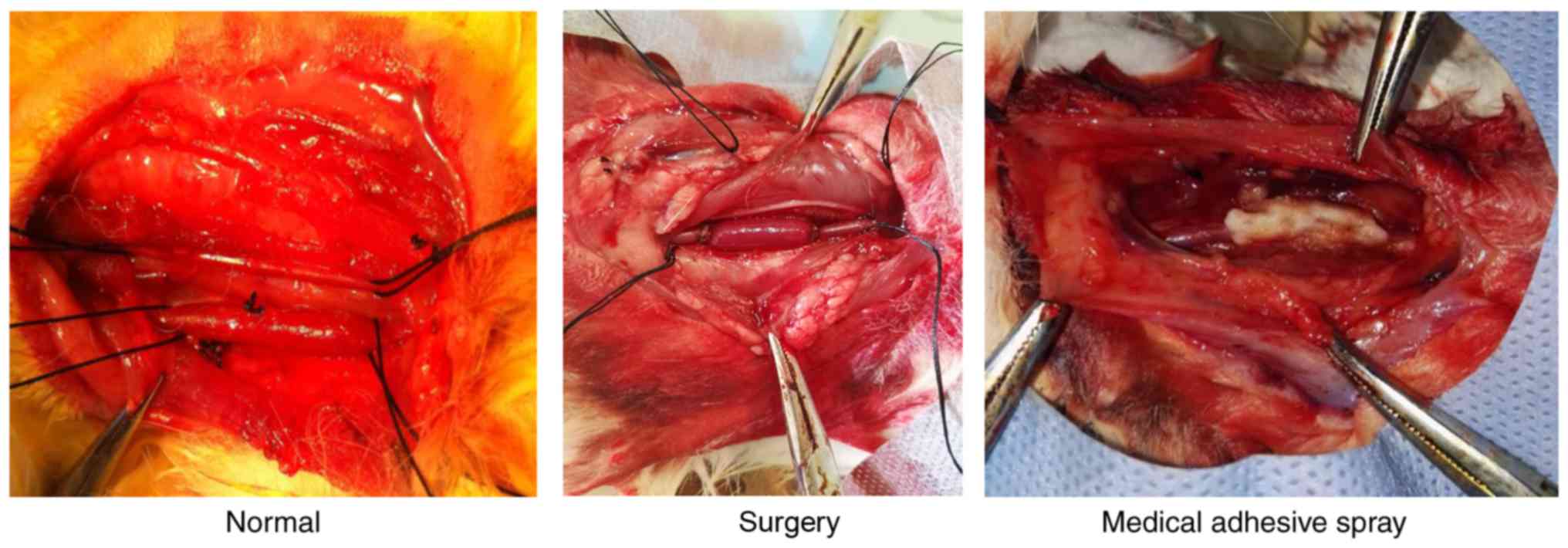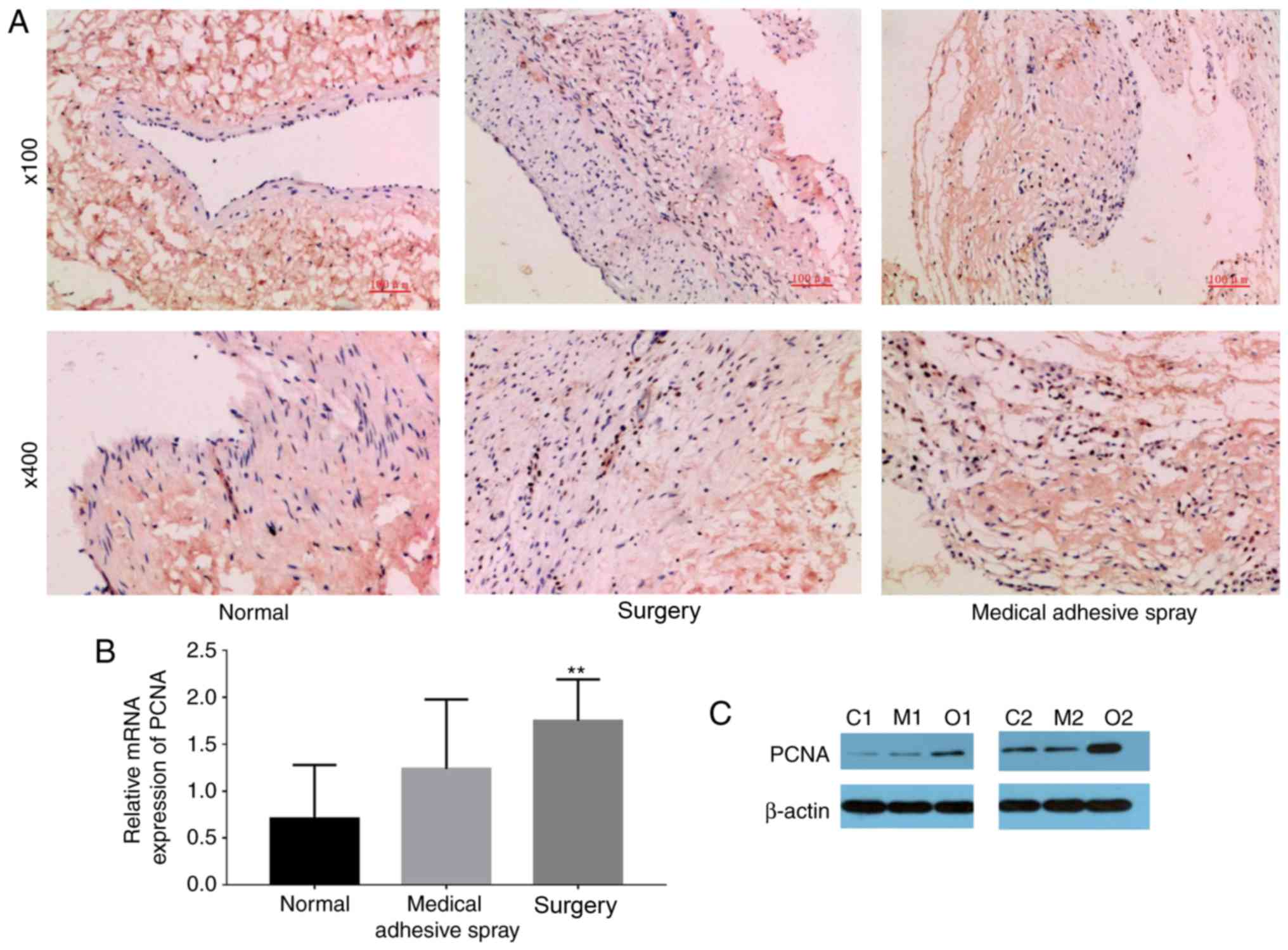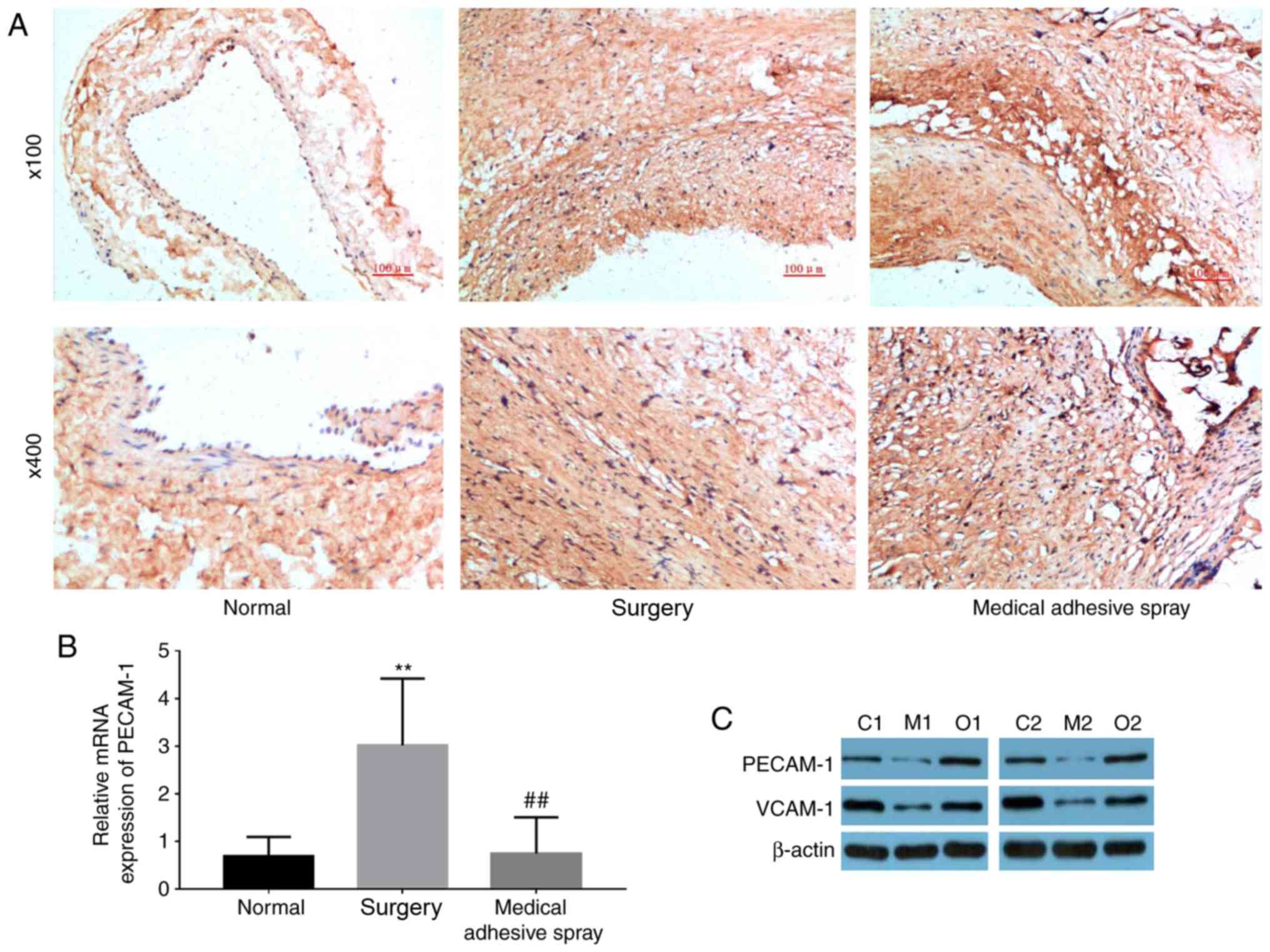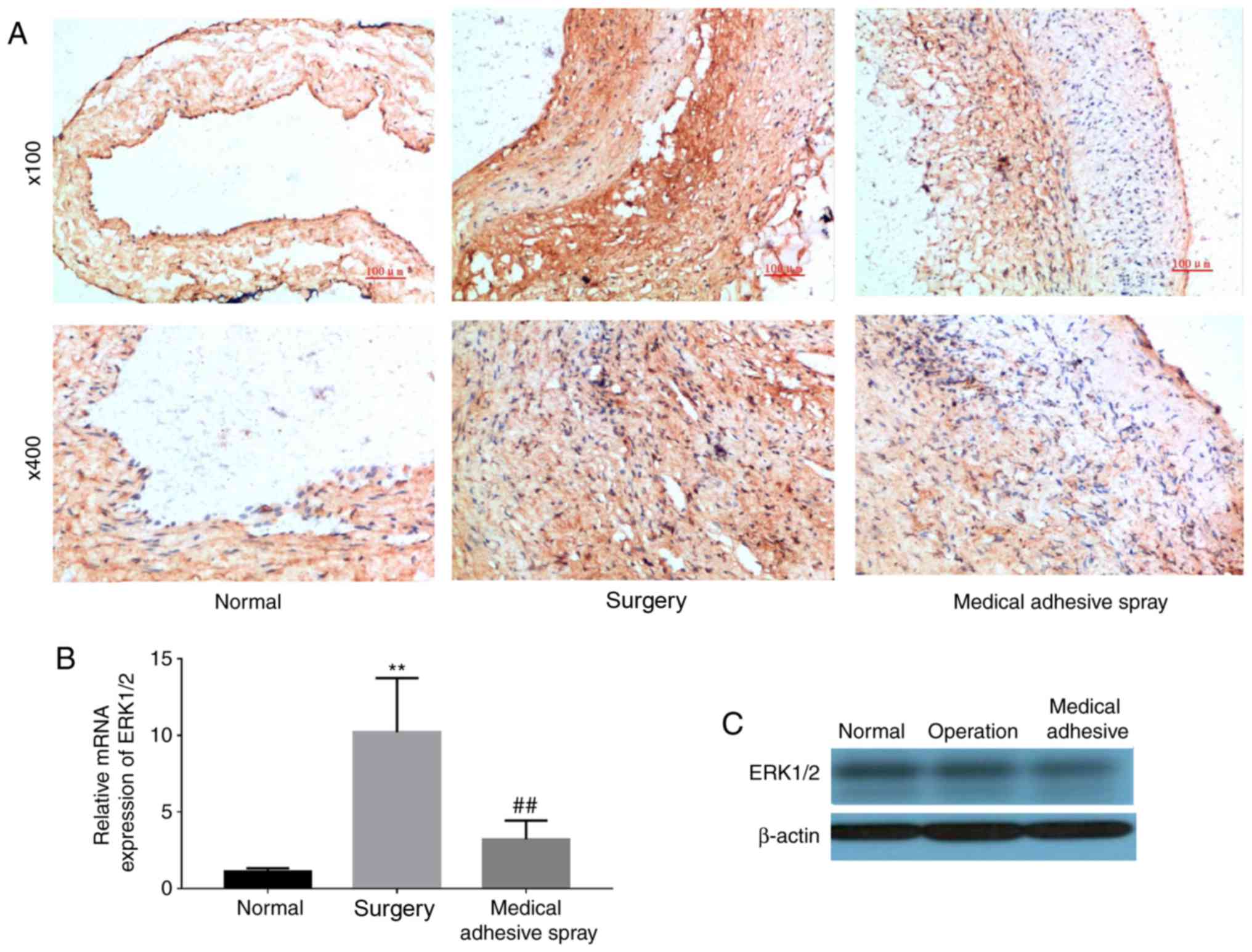|
1
|
Shoab SS, Lowry D and Tiwari A: Effect of
treated length in endovenous laser ablation of great saphenous vein
on early outcomes. J Vasc Surg Venous Lymphat Disord. 4:416–421.
2016. View Article : Google Scholar : PubMed/NCBI
|
|
2
|
Fattoum M, Kennel S, Knez P, Schmitz-Rixen
T, Khout H and Tenholt MH: Lower extremity arterial
revascularization using conditioned small-diameter great saphenous
vein. J Vasc Surg. 64:819–823. 2016. View Article : Google Scholar : PubMed/NCBI
|
|
3
|
Lehoux S and Jones EA: Shear stress,
arterial identity and atherosclerosis. Thromb Haemost. 115:467–473.
2016. View Article : Google Scholar : PubMed/NCBI
|
|
4
|
Heo KS, Fujiwara K and Abe J: Shear stress
and atherosclerosis. Mol Cells. 37:435–440. 2014. View Article : Google Scholar : PubMed/NCBI
|
|
5
|
Cunningham KS and Gotlieb AI: The role of
shear stress in the pathogenesis of atherosclerosis. Lab Invest.
85:9–23. 2005. View Article : Google Scholar : PubMed/NCBI
|
|
6
|
Zeng Y and Liu J: Role of glypican-1 in
endothelial NOS activation under various steady shear stress
magnitudes. Exp Cell Res. 348:184–189. 2016. View Article : Google Scholar : PubMed/NCBI
|
|
7
|
Zeng Y, Waters M, Andrews A, Honarmandi P,
Ebong EE, Rizzo V and Tarbell JM: Fluid shear stress induces the
clustering of heparan sulfate via mobility of glypican-1 in lipid
rafts. Am J Physiol Heart Circ Physiol. 305:H811–H820. 2013.
View Article : Google Scholar : PubMed/NCBI
|
|
8
|
Dunn J, Simmons R, Thabet S and Jo H: The
role of epigenetics in the endothelial cell shear stress response
and atherosclerosis. Int J Biochem Cell Biol. 67:167–176. 2015.
View Article : Google Scholar : PubMed/NCBI
|
|
9
|
Liu JX, Yan ZP, Zhang YY, Wu J, Liu XH and
Zeng Y: Hemodynamic shear stress regulates the transcriptional
expression of heparan sulfate proteoglycans in human umbilical vein
endothelial cell. Cell Mol Biol (Noisy-le-grand). 62:1–34.
2016.
|
|
10
|
Nigro P, Abe J and Berk BC: Flow shear
stress and atherosclerosis: A matter of site specificity. Antioxid
Redox Signal. 15:1405–1414. 2011. View Article : Google Scholar : PubMed/NCBI
|
|
11
|
Vogel V: Mechanotransduction involving
multimodular proteins: Converting force into biochemical signals.
Annu Rev Biophys Biomol Struct. 35:459–488. 2006. View Article : Google Scholar : PubMed/NCBI
|
|
12
|
Boehm EM, Powers KT, Kondratick CM, Spies
M, Houtman JC and Washington MT: The proliferating cell nuclear
antigen (PCNA)-interacting protein (PIP) motif of DNA polymerase
eta mediates its interaction with the C-terminal domain of Rev1. J
Biol Chem. 291:8735–8744. 2016. View Article : Google Scholar : PubMed/NCBI
|
|
13
|
MacNeill SA: PCNA-binding proteins in the
archaea: Novel functionality beyond the conserved core. Curr Genet.
62:527–532. 2016. View Article : Google Scholar : PubMed/NCBI
|
|
14
|
Krejcy K, Schwarzacher S, Ferber W, Plesch
C, Cybulsky MI and Weidinger FF: Expression of VCAM-1 in rabbit
iliac arteries is associated with vasodilator dysfunction of
regenerated endothelium following balloon injury. Atherosclerosis.
122:59–67. 1996. View Article : Google Scholar : PubMed/NCBI
|
|
15
|
Liu D, Ding Z, Wu M, Xu W, Qian M, Du Q,
Zhang L, Cui Y, Zheng J, Chang H, et al: The apolipoprotein A-I
mimetic peptide, D-4F, alleviates ox-LDL-induced oxidative stress
and promotes endothelial repair through the eNOS/HO-1 pathway. J
Mol Cell Cardiol. 105:77–88. 2017. View Article : Google Scholar : PubMed/NCBI
|
|
16
|
Zhou J, Chen L, Fan Y, Jiang J and Wan J:
Atorvastatin increases endothelial progenitor cells in
balloon-injured mouse carotid artery. Can J Physiol Pharmacol.
92:369–374. 2014. View Article : Google Scholar : PubMed/NCBI
|
|
17
|
Zeng Y, Yao X, Chen L, Yan Z, Liu J, Zhang
Y, Feng T, Wu J and Liu X: Sphingosine-1-phosphate induced
epithelial-mesenchymal transition of hepatocellular carcinoma via
an MMP-7/syndecan-1/TGF-β autocrine loop. Oncotarget.
7:63324–63337. 2016. View Article : Google Scholar : PubMed/NCBI
|
|
18
|
Kawasoe Y, Tsurimoto T, Nakagawa T,
Masukata H and Takahashi TS: MutSalpha maintains the mismatch
repair capability by inhibiting PCNA unloading. Elife.
5:e151552016. View Article : Google Scholar : PubMed/NCBI
|
|
19
|
Juríková M, Danihel L', Polák Š and Varga
I: Ki67, PCNA, and MCM proteins: Markers of proliferation in the
diagnosis of breast cancer. Acta Histochem. 118:544–552. 2016.
View Article : Google Scholar : PubMed/NCBI
|
|
20
|
Huang F, Abmayr SM and Workman JL:
Limiting PCNA-unloading at the G1/S transition. Cell Cycle.
153001–3002. 2016.
|
|
21
|
Boehm EM, Spies M and Washington MT: PCNA
tool belts and polymerase bridges form during translesion
synthesis. Nucleic Acids Res. 44:8250–8260. 2016. View Article : Google Scholar : PubMed/NCBI
|
|
22
|
Álvarez V, Viñas L, Gallego-Sánchez A,
Andrés S, Sacristán MP and Bueno A: Orderly progression through
S-phase requires dynamic ubiquitylation and deubiquitylation of
PCNA. Sci Rep. 6:255132016. View Article : Google Scholar : PubMed/NCBI
|
|
23
|
Yokoyama R, Hirakawa T, Hayashi S,
Sakamoto T and Matsunaga S: Dynamics of plant DNA replication based
on PCNA visualization. Sci Rep. 6:296572016. View Article : Google Scholar : PubMed/NCBI
|
|
24
|
Akimoto S, Mitsumata M, Sasaguri T and
Yoshida Y: Laminar shear stress inhibits vascular endothelial cell
proliferation by inducing cyclin-dependent kinase inhibitor
p21(Sdi1/Cip1/Waf1). Circ Res. 86:185–190. 2000. View Article : Google Scholar : PubMed/NCBI
|
|
25
|
Zhang Y, Liao B, Li M, Cheng M, Fu Y, Liu
Q, Chen Q, Liu H, Fang Y, Zhang G and Yu F: Shear stress regulates
endothelial cell function through SRB1-eNOS signaling pathway.
Cardiovasc Ther. 34:308–313. 2016. View Article : Google Scholar : PubMed/NCBI
|
|
26
|
Feng YM, Chen XH and Zhang X: Roles of
PECAM-1 in cell function and disease progression. Eur Rev Med
Pharmacol Sci. 20:4082–4088. 2016.PubMed/NCBI
|
|
27
|
Paddock C, Zhou D, Lertkiatmongkol P,
Newman PJ and Zhu J: Structural basis for PECAM-1 homophilic
binding. Blood. 127:1052–1061. 2016. View Article : Google Scholar : PubMed/NCBI
|
|
28
|
Gu P, Theiss A, Han J and Feagins LA:
Increased cell adhesion molecules, PECAM-1, ICAM-3, or VCAM-1,
predict increased risk for flare in patients with quiescent
inflammatory bowel disease. J Clin Gastroenterol. 51:522–527. 2017.
View Article : Google Scholar : PubMed/NCBI
|
|
29
|
Jiang L, Lin L, Li R, Yuan C, Xu M, Huang
JH and Huang M: Dimer conformation of soluble PECAM-1, an
endothelial marker. Int J Biochem Cell Biol. 77:102–108. 2016.
View Article : Google Scholar : PubMed/NCBI
|
|
30
|
Chistiakov DA, Orekhov AN and Bobryshev
YV: Endothelial PECAM-1 and its function in vascular physiology and
atherogenic pathology. Exp Mol Pathol. 100:409–415. 2016.
View Article : Google Scholar : PubMed/NCBI
|
|
31
|
Wang Z, Lei L, Cai XJ, Chen LY, Yuan M,
Yang G, Huang P and Wang X: A preliminary study of pamidronic acid
downregulation of angiogenic factors IGF-1/PECAM-1 expression in
circulating level in bone metastatic breast cancer patients. Onco
Targets Ther. 9:3147–3152. 2016. View Article : Google Scholar : PubMed/NCBI
|
|
32
|
Lertkiatmongkol P, Paddock C, Newman DK,
Zhu J, Thomas MJ and Newman PJ: The role of sialylated glycans in
human PECAM-1-mediated trans-homophilic interactions and
endothelial cell barrier function. J Biol Chem. 291:26216–26225.
2016. View Article : Google Scholar : PubMed/NCBI
|




















